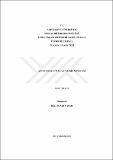Ayetlerde icmal ve tafsil meselesi
| dc.contributor.advisor | Yaşar, Naif | |
| dc.contributor.author | Yildiz, Metin | |
| dc.date.accessioned | 2021-05-09T09:21:45Z | |
| dc.date.available | 2021-05-09T09:21:45Z | |
| dc.date.submitted | 2020 | |
| dc.date.issued | 2020-09-02 | |
| dc.identifier.uri | https://acikbilim.yok.gov.tr/handle/20.500.12812/709179 | |
| dc.description.abstract | İnsanlar için bir hidayet rehberi ve müjdeci olarak gönderilen Kur'an, içerik itibariyle kendisinde birçok hüküm barındırır. Bu hükümler, belli bir metin üslubu içerisinde tematik ve kronolojik olarak değil de karmaşık bir vaziyette ele alınmıştır. Bununla birlikte Kur'an'ın, hükümlerini açıklama konusunda farklı üsluplar kullandığı hakikat götürmez bir gerçektir. İcaz ve ıtnab, mücmel ve mübeyyen, mutlak ve mukayyed, tamim ve tahsis, hükümlerin açıklanma üslupları arasında zikredilmektedir. Kur'an'daki hükümlere baktığımızda bazı hükümlerin tafsilatlı bir şekilde açıklandığı bazı hükümlerin ise tafsilatlandırılmayıp kısa ve öz bir şekilde, ana ilkeler zikredilmek suretiyle genel ifade kalıplarına ve prensiplere yer verildiğini görmekteyiz. Ayetler arasında icmal ve tafsil olarak niteleyebileceğimiz bu üslup Kur'an'ın sıkça başvurduğu bir hüküm açıklama metodudur. Kısa ve öz bir şekilde açıklanan hükümlerin tafsilatlarını Hz. Peygamber'in sünnetinde görmekteyiz. Çünkü Hz. Peygamber'in sünneti, Kur'an'da mücmel olarak yer alan hükümlerin amel konusunda mahiyetlerini, bu hükümlerin sebeplerini, şartlarını veya hükümlerin uygulanmasındaki engelleri açıklamaktadır. Üzerinde ısrarla durmamız gereken bir gerçek vardır ki o da Hz. Peygamber'in gönderiliş gayelerinden birisinin Kur'an vahyini insanlara açıklamak olduğudur. Anahtar Kelimeler: Tefsir, Kur'an, Hüküm, İcmal, Tafsil, İtikat, Ahkam, Hz. Peygamber. | |
| dc.description.abstract | The Qur'an, which is sent as a guide and glad tidings bearer for the human beings, includes many different rules related to the personal and social life. These rules are not set in a thematic and chrolonogial text style but dealt with in a complex mode. However, it is an indisputable fact that the Qur'an, uses different ways to explain its rules. The brief and the detailed statements, figurative and metaphorical phares, general and restricted expressions are mentioned among the explanation styles of the commandments. When we examine the rules of the Qur'an we can notice that certain commandments are not explanied in a detailed manner but in a short and concise way and also we see that general phrases and principles are included just by mentioning the main points. This style which can be described as `the brief and detailed Quranic versing style`, is a method of explanation which is frequently within the Qur'anic text. We can trace the detailed explanations of the summed up commandments in the sunnah of the Prophet (pbuh). Because the sunnah of the Prophet (pbuh) explains the nature, reasons, conditions or obstacles of the outlined commandments of the Qur'an. There is an important point which we need to highlight that the Prophet (pbuh) has been sent to the human beings in order to explain to them the revelation of the Qur'an. Keywords: Exegesis, Qur'an, Commandment, Brief explanations, Detailed explanations, Creed, The Prophet. | en_US |
| dc.language | Turkish | |
| dc.language.iso | tr | |
| dc.rights | info:eu-repo/semantics/openAccess | |
| dc.rights | Attribution 4.0 United States | tr_TR |
| dc.rights.uri | https://creativecommons.org/licenses/by/4.0/ | |
| dc.subject | Din | tr_TR |
| dc.subject | Religion | en_US |
| dc.title | Ayetlerde icmal ve tafsil meselesi | |
| dc.title.alternative | The brief and detailed Quranic versing style | |
| dc.type | masterThesis | |
| dc.date.updated | 2020-09-02 | |
| dc.contributor.department | Temel İslam Bilimleri Ana Bilim Dalı | |
| dc.identifier.yokid | 10237594 | |
| dc.publisher.institute | Sosyal Bilimler Enstitüsü | |
| dc.publisher.university | ADIYAMAN ÜNİVERSİTESİ | |
| dc.identifier.thesisid | 633469 | |
| dc.description.pages | 114 | |
| dc.publisher.discipline | Tefsir Bilim Dalı |


